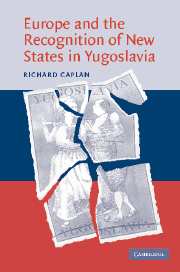Book contents
- Frontmatter
- Contents
- Acknowledgements
- Introduction
- 1 The EC's recognition policy: origins and terms of reference
- 2 Recognition of states: legal thinking and historic practice
- 3 International law, international relations and the recognition of states
- 4 EC recognition of new states in Yugoslavia: the strategic consequences
- 5 Political conditionality and conflict management
- Conclusion
- Appendices
- Bibliography
- Index
- References
Bibliography
Published online by Cambridge University Press: 22 September 2009
- Frontmatter
- Contents
- Acknowledgements
- Introduction
- 1 The EC's recognition policy: origins and terms of reference
- 2 Recognition of states: legal thinking and historic practice
- 3 International law, international relations and the recognition of states
- 4 EC recognition of new states in Yugoslavia: the strategic consequences
- 5 Political conditionality and conflict management
- Conclusion
- Appendices
- Bibliography
- Index
- References
- Type
- Chapter
- Information
- Europe and the Recognition of New States in Yugoslavia , pp. 196 - 223Publisher: Cambridge University PressPrint publication year: 2005



